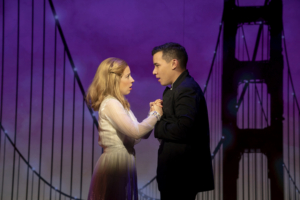Review Roundup: What Did the Critics Think of SOFT POWER at the Public?

The Public Theater presents Soft Power, with play and lyrics by Tony Award winner David Henry Hwang, music and additional lyrics by Tony Award winner Jeanine Tesori, choreography by Tony nominee Sam Pinkleton, and is directed by Tony nominee Leigh Silverman.
SOFT POWER began with a Joseph Papp Free Preview performance on Tuesday, September 24 in The Public's Newman Theater and will run through Sunday, November 10.
The complete cast of SOFT POWER includes Billy Bustamante (Xue Xing Standby), Jon Hoche (Tony Manero/Chief Justice/Ensemble), Kendyl Ito (Jing/Ensemble), Francis Jue (DHH), Austin Ku (Bobby Bob/Ju Ming), Raymond J. Lee (Randy Ray/VEEP/Ensemble), Alyse Alan Louis (Zoe/Hillary), Jaygee Macapugay (Campaign Manager/Ensemble), Daniel May (Ensemble), Paul HeeSang Miller (Ensemble), Kristen Faith Oei (Ensemble), Geena Quintos (Ensemble), Conrad Ricamora (Xue Xing), Trevor Salter (Ensemble), Kyra Smith (Ensemble), Emily Stillings (Swing), Emily Trumble (Zoe/Hillary Standby), and John Yi (Swing).
Let's see what the critics are saying...
Jesse Green, The New York Times: Such is the cleverness, and confusion, of "Soft Power," which the authors call a "play with a musical." Bristling with ideas that rarely get dramatized, let alone in such imaginative form, it is something of a miracle but also something of a muddle, the ideas scrambling over one another for prominence and the ingenious form unable to corral them. Still, those ideas - about the betrayals inherent in love, democracy and musicals themselves - are too exciting and important to dismiss by quibbling them to death.
Michael Dale, BroadwayWorld: The versatile composer Jeanine Tesori works with Hwang's lyrics, and supplying additional lyrics herself, for a score that liberally echoes styles of, though not directly quoting, the work of Stephen Sondheim, Meredith Willson, Lin-Manuel Miranda, Leonard Bernstein, Betty Comden and Adolph Green, Irving Berlin and several more (as well as mimicking an iconic moment of Jerome Robbins choreography). Orchestrator Danny Troob is also in on the act, supplying lush string arrangements, snazzy brass passages and contemporary electronic sounds played by music director Chris Fenwick's 21-piece orchestra. But this is no ordinary pastiche. The point is to see a version of American, and of American musical theatre, as seen through a Chinese lens as inaccurate as Rodgers and Hammerstein's lens when focused on Siam.
Frank Rizzo, Variety: In Hwang's very personal expression of cultural estrangement and connection, "Soft Power" does more than simply come to terms with personal identity - it's looking at America's identity, too. It also miraculously manages to be subversive as well as funny, touching and thoroughly entertaining. "Soft Power" deserves to be fast-tracked to a larger stage, where its sweep, smarts and 20-piece orchestra can be presented in what the piece itself refers to as a "big, big show."
Frank Scheck, The Hollywood Reporter: The performances are uniformly terrific: Ricamora (who ironically made his Broadway debut in a revival of The King and I) makes for a sexy and charismatic leading man; Jue brings a deadpan hilarity to his performance as a playwright with whom he has frequently collaborated; and Louis, who previously won an LA Ovation Award for her performance, is an absolute hoot as a deeply sympathetic Hillary who finds herself falling for a Chinese man with whom she engages in a series of spirited debates about the respective merits of their countries' forms of government. The large ensemble, many of them playing cartoonish American characters, are clearly having a blast reversing the past injustice of Caucasians so often playing Asian roles. Tom Watson's over-the-top hair, wigs and makeup designs only add to the fun.
David Cote, Observer: Directed with the right balance of dry wit and shameless razzmatazz by Leigh Silverman, Soft Power boasts one of the most appealing and hard-working ensembles onstage today and it's consistently engaging and amusing. Still, for all its wit, structural sophistication, and still-resonant political punch, I couldn't help but wish the material had more heart. Hwang's anxieties about race and nativist violence are threaded through the play, but their emotional impact is diluted by rampant satire and grotesquerie. The romance between Hillary and Xūe adds a little heat and sugar, but that too is buried under the comedy and cross-cultural critique. For a work about the dysfunctional economic and diplomatic marriage between America and China, I almost think the creators intentionally arranged a problematic union between a play and a musical: a running battle between hearts and minds. One thing is sure: Soft Power is too weird and freethinking to fill a giant state theater in Shanghai. It may tickle those interested in new musicals, but I doubt it will convert the masses.
Johnny Oleksinski, New York Post: Despite their headache-inducing material, the lead actors seem to be having fun as they skillfully hop between modern and classic settings. That makes sense, especially for Ricamora, who's starred in both "Here Lies Love" and "The King and I." But you're still left with a hodgepodge of a show. There is so much going on in Hwang and Tesori's musical, that its power turns out to be just as described: soft.
Jackson McHenry, Vulture: Soft Power wisely includes critiques of the musical-within-the-show's communism (in case you're worried the toe-tapping will just lead to totalitarianism), and it finally redirects toward ambivalence. It's a forceful ambivalence, though, backed by the full arsenal of the American musical, with strings and horns and a whole ensemble of actors, all deployed here not to deliver an ideology but to try to shake you out of one.
Robert Hofler, The Wrap: Putting aside this blatant cultural appropriation for a moment, the score's eclecticism accurately reflects the book's messiness. Although Hwang is clearly obsessed with Oscar Hammerstein II, "Soft Power" only inflates when the book lifts directly from the "King and I" plot, such as the waltz between the King/Hillary and Anna/Xue Xing. When Hwang isn't directly copying Hammerstein, "Soft Power" loses all narrative energy.
Reader Reviews


